| Listing 1 - 8 of 8 |
Sort by
|

ISBN: 9027225419 9786613359322 1283359324 9027279993 9789027279996 9789027225412 9781283359320 6613359327 Year: 1984 Volume: vol 8 Publisher: Amsterdam Benjamins
Abstract | Keywords | Export | Availability | Bookmark
 Loading...
Loading...Choose an application
- Reference Manager
- EndNote
- RefWorks (Direct export to RefWorks)
Code-switching and related phenomena have met with linguists' increasing interest over the last decade. However, much of the research has been restricted to the structural (grammatical) properties of the use of two languages in conversation; scholars who have tried to capture the interactive meaning of switching have often failed to go beyond more or less anecdotal descriptions of individual, particularly striking, cases. The book bridges this gap by providing a coherent, comprehensive and generative model for language alternation, drawing on recent trends and methods in conversational analysis. The empirical basis is the speech of Italian migrant children in Constance, Germany.
Pragmatics --- Conversatie. --- Codewisseling [Taalwetenschap]. --- Bilinguisme --- Conversation. --- Codes (Passage de) [Linguistique]. --- Tweetaligheid. --- Code switching (Linguistics) --- Talking --- Colloquial language --- Etiquette --- Oral communication --- Language shift --- Switching (Linguistics) --- Bilingualism --- Linguistics --- Diglossia (Linguistics) --- Script switching (Linguistics) --- Changement de code (linguistique) --- Linguistique --- Conversation
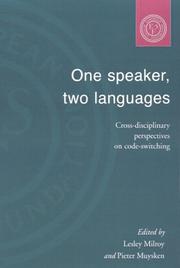
ISBN: 0521473500 0521479126 9780521473507 9780521479127 9780511620867 0511620861 Year: 1995 Publisher: Cambridge Cambridge University press
Abstract | Keywords | Export | Availability | Bookmark
 Loading...
Loading...Choose an application
- Reference Manager
- EndNote
- RefWorks (Direct export to RefWorks)
Code-switching - the alternating use of several languages by bilingual speakers - does not usually indicate lack of competence on the part of the speaker in any of the languages concerned, but results from complex bilingual skills. The reasons why people switch their codes are as varied as the directions from which linguists approach this issue, and raise many sociological, psychological, and grammatical questions. This volume of essays by leading scholars brings together the main strands of current research in four major areas: the policy implications of code-switching in specific institutional and community settings; the perspective of social theory on code-switching as a form of speech behaviour in particular social contexts; the grammatical analysis of code-switching, including the factors that constrain switching even within a sentence; and the implications of code-switching in bilingual processing and development.
Code switching (Linguistics). --- Code-switching (linguïstiek). --- Tweetaligheid. --- Language shift --- Switching (Linguistics) --- Diglossia (Linguistics) --- 800.73 --- Code switching (Linguistics) --- Bilingualism --- Linguistics --- 800.73 Tweetaligheid. Meertaligheid. Vreemde talen. Vertalen --- Tweetaligheid. Meertaligheid. Vreemde talen. Vertalen --- Psycholinguistics --- Comparative linguistics --- Sociolinguistics --- Bilingualism. --- Bilinguisme. --- Changement de code (Linguistique). --- Codewisseling. --- Sociolinguistique. --- Sprachwechsel. --- Zweisprachigkeit. --- Arts and Humanities --- Language & Linguistics --- Script switching (Linguistics)

ISBN: 0521414849 Year: 1995 Volume: 14 Publisher: Cambridge Cambridge University Press
Abstract | Keywords | Export | Availability | Bookmark
 Loading...
Loading...Choose an application
- Reference Manager
- EndNote
- RefWorks (Direct export to RefWorks)
Ethnology --- Language and culture --- Tok Pisin language --- Linguistic change --- Social change --- Code switching (Linguistics) --- Anthropologie sociale et culturelle --- Langage et culture --- Tok pisin (Langue) --- Changement linguistique --- Changement social --- Changement de code (Linguistique) --- Grammar --- Morphology --- Grammaire --- Morphologie --- Gapun (Papua New Guinea) --- Gapun (Papouasie-Nouvelle-Guinée) --- Social life and customs. --- Moeurs et coutumes --- Sociolinguistics --- Papua New Guinea
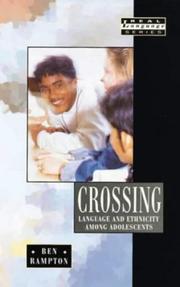
ISBN: 0582217911 9780582217911 0582217903 Year: 1995 Publisher: London Longman
Abstract | Keywords | Export | Availability | Bookmark
 Loading...
Loading...Choose an application
- Reference Manager
- EndNote
- RefWorks (Direct export to RefWorks)
Sociolinguistics --- Great Britain --- Sociolinguistique --- --Grande-Bretagne --- --Langage /et Éducation --- Adolescent --- --Langage --- --Bilinguisme --- --Code switching (Linguistics) --- Languages in contact --- Youth --- Language and education --- 16 --- Language --- Code switching (Linguistics) --- Language. --- --Adolescent --- Éducation --- --Language --- Langage --- Bilinguisme --- Code switching (Linguistics) - Great Britain --- Sociolinguistics - Great Britain --- Languages in contact - Great Britain --- Youth - Great Britain - Language --- Language and education - Great Britain --- Grande-Bretagne --- Changement de code (Linguistique) --- Langues en contact --- Jeunesse --- Langage et éducation --- Langue
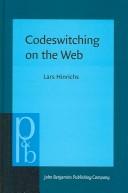
ISBN: 1282155423 9786612155420 9027293309 9789027293305 9789027253903 9027253900 Year: 2006 Publisher: Amsterdam Benjamins
Abstract | Keywords | Export | Availability | Bookmark
 Loading...
Loading...Choose an application
- Reference Manager
- EndNote
- RefWorks (Direct export to RefWorks)
Based on a corpus of private email from Jamaican university students, this study explores the discourse functions of Jamaican Creole in computer-mediated communication. From this participant-centered perspective, it contributes to the longstanding theoretical debates in creole studies about the creole continuum. The book will likewise be useful to students of computer-mediated communication, the use and development of non-standardized languages, language ecology, and codeswitching. The central methodological issue in this study is codeswitching in written language, a neglected area of study at the moment since most literature in codeswitching research is based on spoken data. The three analytical chapters present the data in a critical discussion of established and more recent theoretical approaches to codeswitching. Fields that will benefit from this book include interactional sociolinguistics, creole studies, English as a world language, computer-mediated discourse analysis, and linguistic anthropology.
Code switching (Linguistics) --- Creole dialects, English --- English language --- Electronic mail messages. --- Germanic languages --- English Creole languages --- Negro-English dialects --- Language shift --- Switching (Linguistics) --- Bilingualism --- Linguistics --- Diglossia (Linguistics) --- E-mail correspondence --- E-mail messages --- Email correspondence --- Email messages --- Telematics --- Social aspects --- Electronic mail messages --- Computer architecture. Operating systems --- Pragmatics --- Sociolinguistics --- Creolan languages --- Script switching (Linguistics) --- CHANGEMENT DE CODE (LINGUISTIQUE) --- LANGUES CREOLES (ANGLAISES) --- ANGLAIS (LANGUE) --- COURRIELS --- JAMAIQUE --- ASPECT SOCIAL
Multi
ISBN: 9036197767 Year: 1996 Volume: 1 Publisher: Tilburg Tilburg university press
Abstract | Keywords | Export | Availability | Bookmark
 Loading...
Loading...Choose an application
- Reference Manager
- EndNote
- RefWorks (Direct export to RefWorks)
Sociolinguistics --- Netherlands --- Code switching (Linguistics) --- Bilingualism --- Turks --- Languages in contact --- Dutch language --- Turkish language --- Cognitive grammar --- Changement de code (Linguistique) --- Bilinguisme --- Turcs --- Langues en contact --- Néerlandais (Langue) --- Turc (Langue) --- Grammaire cognitive --- Languages --- Social aspects --- Langues --- Aspect social --- -Code switching (Linguistics) --- -Cognitive grammar --- -Languages in contact --- -Turkish language --- -Turks --- -Turkish people --- Ethnology --- Turkic peoples --- Osmanic language --- Osmanli language --- Ottoman Turkish language (Arabic script) --- Turkic languages --- Turkic languages, Southwest --- Areal linguistics --- Flemish language --- Netherlandic language --- Germanic languages --- Cognitive linguistics --- Grammar, Comparative and general --- Psycholinguistics --- Language shift --- Switching (Linguistics) --- Linguistics --- Diglossia (Linguistics) --- Language and languages --- Multilingualism --- -Languages --- Cognitive grammar. --- Social aspects. --- Languages. --- -Social aspects --- -Cognitive linguistics --- Turkish people --- Néerlandais (Langue) --- Script switching (Linguistics)
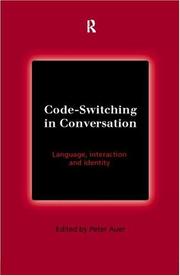
ISBN: 1280442662 9786610442669 1134606737 0203017889 9781134606733 9780203017883 9780415158312 0415158311 9780415216098 0415216095 9781134606689 9781134606726 1134606729 Year: 1998 Publisher: London Routledge
Abstract | Keywords | Export | Availability | Bookmark
 Loading...
Loading...Choose an application
- Reference Manager
- EndNote
- RefWorks (Direct export to RefWorks)
The use of two or more languages within a conversation (known as code-switching) is the subject of this compilation of views from an internationally based team of linguists. The subject is currently of great interest in linguistic circles.
Code switching (Linguistics) --- Conversation analysis. --- Bilingualism. --- Discourse analysis. --- Analysis of conversation --- CA (Interpersonal communication) --- Conversational analysis --- Oral communication --- Discourse grammar --- Text grammar --- Semantics --- Semiotics --- Language and languages --- Languages in contact --- Multilingualism --- Language shift --- Switching (Linguistics) --- Bilingualism --- Linguistics --- Diglossia (Linguistics) --- Conversation analysis --- Discourse analysis --- #SBIB:309H511 --- #SBIB:309H518 --- Verbale communicatie: algemene pragmatiek, stilistiek en teksttheorie, discoursanalyse --- Verbale communicatie: sociologie, antropologie, sociolinguistiek --- Code switching (Linguistics). --- Pragmatics --- Sociolinguistics --- Analyse de la conversation --- Changement de code (Linguistique) --- Bilinguisme --- Analyse du discours --- Alternance de codes (linguistique) --- Script switching (Linguistics) --- Diglossie
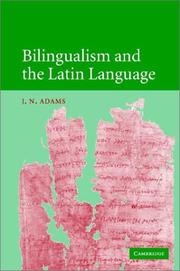
ISBN: 0521817714 0521731518 9786610434435 0511178956 0511042736 0511306091 0511148909 0511482965 1280434430 0511054483 9780511042737 9780511482960 9781280434433 9780511054488 9780521817714 9780521731515 Year: 2008 Publisher: Cambridge Cambridge University Press
Abstract | Keywords | Export | Availability | Bookmark
 Loading...
Loading...Choose an application
- Reference Manager
- EndNote
- RefWorks (Direct export to RefWorks)
Since the 1980s, bilingualism has become one of the main themes of sociolinguistics - but there are as yet few large-scale treatments of the subject specific to the ancient world. This book is the first work to deal systematically with bilingualism during a period of antiquity (the Roman period, down to about the fourth century AD) in the light of sociolinguistic discussions of bilingual issues. The general theme of the work is the nature of the contact between Latin and numerous other languages spoken in the Roman world. Among the many issues discussed three are prominent: code-switching (the practice of switching between two languages in the course of a single utterance) and its motivation, language contact as a cause of change in one or both of the languages in contact, and the part played by language choice and language switching in the establishment of personal and group identities.
Code-switching (Linguistics) --- Foreign elements. --- Bilingualism --- Languages in contact --- Latin language --- Foreign words and phrases. --- Influence on foreign languages. --- Classical languages --- Italic languages and dialects --- Classical philology --- Latin philology --- Areal linguistics --- Language shift --- Switching (Linguistics) --- Linguistics --- Diglossia (Linguistics) --- Language and languages --- Multilingualism --- Foreign elements --- Foreign words and phrases --- Influence on foreign languages --- Latin (Langue) --- Langues en contact --- Bilinguisme --- Changement de code (Linguistique) --- History --- Emprunts --- Histoire --- Influence sur les autres langues --- Mots et locutions étrangers --- Arts and Humanities --- Code switching (Linguistics) --- Historical linguistics --- Sociolinguistics --- Romance languages --- Latin language - Foreign elements. --- Languages in contact - Rome. --- Latin language - Influence on foreign languages. --- Latin language - Foreign words and phrases. --- Bilingualism - Rome. --- Code-switching (Linguistics) - Rome. --- Script switching (Linguistics)
| Listing 1 - 8 of 8 |
Sort by
|

 Search
Search Feedback
Feedback About UniCat
About UniCat  Help
Help News
News